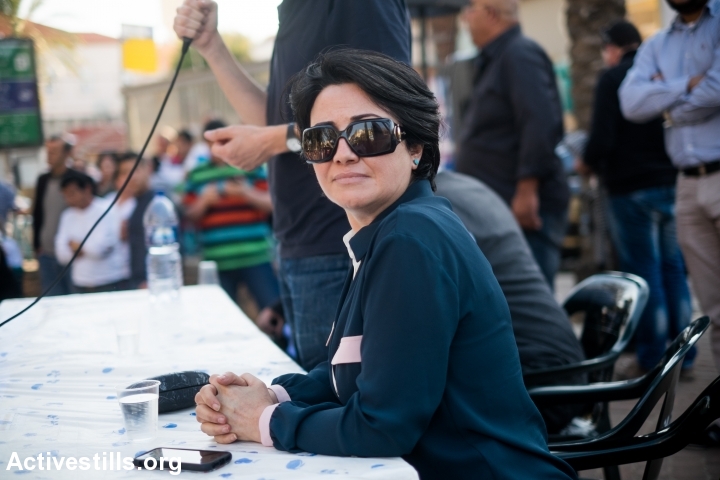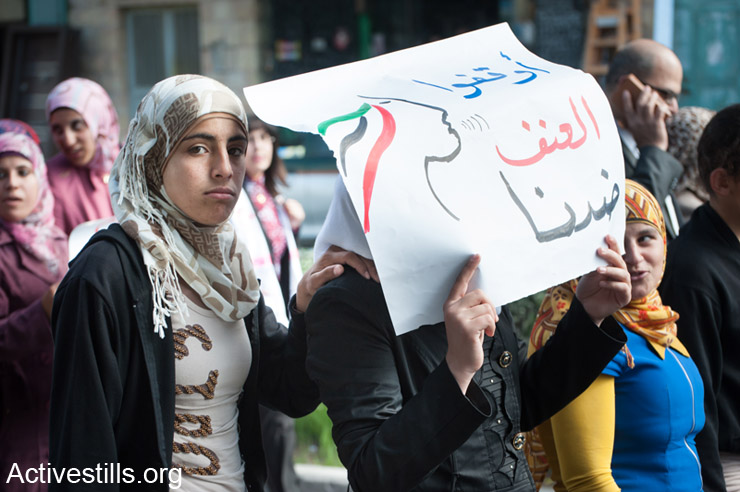Palestinian MK Haneen Zoabi bravely came out against violence directed at women and the way firearms are being used to terrorize the residents of Arab towns. But the demand for ‘social oversight’ over the mosques takes the matter one step too far.
(Translated from Hebrew by Sol Salbe)

A painful and very important discussion is taking place in the Arab community in Israel, especially among those who are active on Facebook. And at the center of it is Palestinian MK Haneen Zoabi. The conversation harks back to the women’s marathon in the city of Tira and the violent threats against its organizer — a woman. So you would have already heard of and been impressed by the support offered by members of the Joint List for the struggle by Arab women against violence as well as the exclusion of women from the public sphere.
For Zoabi this is an issue close to her heart; it stokes the fire in her belly. She posted a status on Facebook in which she asked who are the “barbarians” who are terrorizing people with violence and weapons. Zoabi wrote of social terrorism against women, and women’s freedom of movement, expression and conduct.
Ostensibly, her comments were both just and on point — the phenomenon of Arab towns being ruled by a handful of armed violent criminals is a painful affliction in our community. Just yesterday a resident of Jaljulya was murdered by gunfire. Last week a school principal was shot and severely wounded in Kuseife. But Zoabi’s post went on to analyze the situation of religious coercion and incitement against both women and men who offer a different voice. And more significantly — Zoabi hinted at a link between clerics and extremists who seek control through violence and firearms. She added a demand that all the political movements, including the Islamic Movement must enhance their “social control” of clerics and imams in Arab towns and villages. They need to supervise what is said in the said in mosques on Fridays. “There are some people who think it is their own fiefdom,” wrote Zoabi.
Naturally, this statement angered many people who mobilized to defend Islam, the clerics and the Islamic Movement, whose members had condemned the shooting of the women’s marathon organizer and, alongside all the Joint List Knesset members, supported her.
From here on, the lively discussion very quickly became stormy and heated. Serious accusations of incitement, slander and “disturbing the peace” were hurled at Zoabi. This was the trigger for Photoshop wizards who rushed to fabricate shocking images of the MK. In one of them, Zoabi’s shaved head was superimposed on an orange-clad man’s body, next to whom there was a black-draped ISIS fighter! (Does that methodology remind us of anything?). This picture repulsed me, sending shivers up my spine in a way that I had never felt before; I felt as if the horrors of Islamic State are closer to me than ever before. Look at just how far the extreme right’s campaign of fear and incitement has permeated our community. For these were the same images used by the extreme right in its campaign to anoint Zoabi as the enemy of the people. And, of course, the sight of ISIS’ crimes, which are all over the Internet, govern our consciousness, crossing all boundaries or red lines of morality and law — of what is legitimate and what is permissible within the limits of freedom of expression.

I agree in principle with Zoabi’s contention that even the most difficult and painful issues within Palestinian society need to be dealt with through an open and civilized discussion. I do not doubt for a moment that she has made a genuinely brave attempt to tell her truth, and to fight from within against the stifling of opinions combined with social oppression — especially the oppression of women under the false guise of religion. But despite my agreement, I think that Zoabi has utilized all the artillery in her possession and in the process has hit some sensitive and delicate spots within our internal discourse.
This is something that, in my opinion, should have been done. But I think that discussion of women’s participation in the Tira marathon and the struggle against a handful of “opinion offenders” should not have reached the point of demanding social supervision of the study halls and mosques on Fridays. This is still considered a sacred cow, and there is widespread, albeit delicate, consensus on this issue. Moreover, the demand for social supervision over what is happening in mosques carried with it unpleasant associations, given the constant fear that the state supervises what is said in the mosques. For reasons ostensibly to do with “security,” the state uses Shin Bet and the other long arms of its security apparatus for this purpose.
So the demand for some additional oversight, even if anchored in a different set of reasons, is not exactly a smart idea. In my opinion, it also contradicts the very agenda that Zoabi herself is trying to advance: that of democracy through dialogue, a multitude of opinions, freedom of worship and the right of women to move about, speak and dress as they see fit, free from “oppressive social control.”
Read also: Who will put an end to the murder of Arab women in Israel?
So by what right does she want to supervise the mosques? And what is this apparatus of social control? I certainly agree that the debate should take place, and it is time to burst the balloon, but I am afraid that the very arrogant and uncontrolled nature of her approach will leave behind many untreated bits and pieces scattered all over the place. Instead of building a partnership, it would damage the existing positive process which I feel it is taking place, albeit slowly.
I genuinely believe that the Islamic Movement, including all the currents and tendencies, is moving toward the political center. It has agreed to become part of the Joint List, and the messages it has been putting out have the right tone and are in the right direction. True, we still have problems and bitter arguments about polygamy, women’s representation, the imposition of hijab, advancement of women’s rights and more. And I, like many other daughters and sons of my people, find myself swallowing the bitter pill on feminist issues, such as the presence of the movement as part of the Joint List. But I think that the path to changing the movement is different. For me the demand for liberty and freedom starts with my ability to survive in an environment where there are people who have faith, clothing and rituals that are different from mine.
If we agree on some boundaries within the public discourse, in which violence is unacceptable and is not considered part of our common values, then we might be able to move forward toward social partnership and mutual responsibility. Sound too good to be true? Maybe, but there are no shortcuts in the process of social change, and no great revolutions either. There are small, significant steps that need to be taken and increased in number. One example is the little protest action last week in the northern village of Shibli. The mayor of the village decided to organize a community protest against violence, after a woman there was murdered.
True, it was depressing to note that in the leaflet distributed at the protest there was no mention that 46-year-old Shadia Shibli was murdered on the basis of her gender. But in the past when women were murdered in the same village, no one was willing to organize a protest at all. Thus, this modest step is very important to me. And if we were to come out against the council and the mosque and the whole world for their cowardice and their surrendering to terrorism the street, I doubt we would have made any headway.
Another point that ought to be examined is the ease with which men allow themselves, without batting an eyelid, to attack a woman — an elected official who represents many women and men who think like her. Nobody compared the men who have said or written the same message in the past to stray dogs, not to mention called for them to be harmed. Animus toward women who dare to refuse to be nice and apologetic — as society expects them to be — is part and parcel of the oppression of women. From that perspective, it is good to have one Zoabi who places a magnifying glass right in front of us.
And you, my Jewish-Israeli readers, who are being exposed to our dirty laundry: I invite you to look at the whole of society and see how similar are we to each other, how much we are influenced by one another. Israeli society’s attitude to assertive and powerful women is just as sexist and offensive, be it in politics or other facets of society.
Samah Salaime Egbariya is a social worker, a director of AWC (Arab Women in the Center) in Lod and a graduate of the Mandel Leadership Institute in Jerusalem. This article was first published on +972′s Hebrew-language sister site, Local Call. Read it in Hebrew here. Translated by Sol Salbe of the Middle East News Service, Melbourne, Australia.


